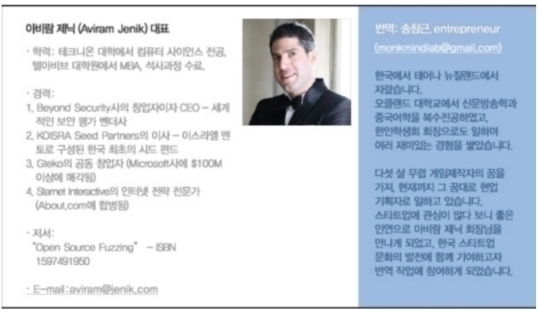저는 한국에 거주한 대부분의 시간을 스타트업 투자에 적극적으로 써왔습니다. 그리고 이곳 한국 역시, 다른 나라의 스타트업 환경들과 비교해 몇몇 문화적인 차이가 존재하지요. 이 중 일부는 한국의 고유 문화에서 왔거나, 또는 한국의 생태계가 발전해오며(여전히 발전 중에 있지만) 비롯된 부분도 있습니다.
다른 나라에서 온 외국인으로서, 이런 것들에 적응해야하는 쪽은 저입니다. 전 한국에 살고있는 매일매일을 노력하고 있고, 특히나 한국 스타트업들과 교류해야하는 상황에서라면 더더욱 그렇습니다. 문화적인 갭을 좁히고, 외국으로 이들이 나아갈 수 있도록 다리를 놓아줘야할 사람은 접니다. 그런데 이런 문화적 차이 중에서도 제가 굽히길 거부하는 부분이 하나 있습니다. 아니, 사실은 한국 스타트업들의 이런 버릇을 깨보도록 하기위해 최선을 다해 노력하고 있는 중인데요, 한 편 궁금하게 생각되는 부분이기도 합니다. 바로 `어째서 한국 스타트업들은 글로벌 진출을 거부하는 것인가?`하는 부분이지요.
저는 조선시대의 한국인들이 동아시아(일본, 중국 및 주변 국가)이외 세계와 접촉을 최소화하고 싶었던 이유를 이해할 수 있습니다. 허나 현재 21세기를 지배하는 논리는 무엇인가요? 한국 스타트업들이 말로는 글로벌로 나아가길 원한다하지만, 정작 실제로 그걸 하는 곳은 없습니다.
만약 이 글을 읽고 계신 당신이 한국의 스타트업 관계자라면, 스스로에게도 물어보시기 바랍니다. 굳이 가까운 시장인 일본이나 중국에 집중하지 않고도, 저 멀리 미국과 유럽시장에 집중해야할 이유가 있다면 무엇인가요? 뭔가 `신의 중재`가 없고서야 이런 일이 가능케끔 할 수 있는 일은 없을까요?
이와 관련해 제가 자주 듣(지만 받아들일 수는 없는) 이유가 있다면 이겁니다. 일단 `어떻게`해야 글로벌 진출을 할 수 있는지 모르겠다는 말을 듣는데요, 이건 완전히 말도 안되는 이야기입니다. 당장 인터넷만 이용해도 수천가지 설명과 가이드, 책이라던가 각종 기사 및 지식 베이스에 즉시 접근이 가능하기 때문입니다. 게다가 이미 스스로의 경험으로 세일즈부터 마케팅, 그리고 개발까지 배워본 경험이 있을테구요. 이것과 다를게 없지요.
게다가, 그 과정 중 대부분은 현재 당신이 한국에서 하고있는 일과 비슷하지요. 단지 몇몇 부분에 있어 다르게 적용되야할 부분이 있긴 하지만요. 그 누구도 미국시장에서 성공하는 법에 대해 지식을 가진 채로 태어나지 않습니다. 실제로 성공을 이뤄낸 자들은 직접 그것을 배웠거나, 누군가에게 물었거나, 또는 실패를 통한 배움을 시도해가며 결실을 이뤄낼 수 있던 것이죠.
그 외에 (보통 술을 마시고나서 듣게되는 간접적인 식으로) 듣는 또 한가지 이유가 있다면, 바로 글로벌 시장이 한국 시장에 비해 위험요소가 더 많다는 의견입니다. 잘못된 주장은 아니지만, 설득력이 약하네요. 만약 정말 위험요소를 줄이고자한다면, 대기업에 들어가 자신의 자유를 사회적 안정감 및 고용안정성에 교환하시면 됩니다. 허나 지금 당신은 스타트업에 들어와 모든 리스크를 걸어본다는 선택을 하지 않았습니까? 글로벌 시장 진출이란 이미 기존에 여럿 존재했던 리스크들에 단지 하나를 더 추가하는 것 뿐입니다.
저는 한때 한국 스타트업 생태계를 조금 더 외향적이고 객관적인 시각으로 바라볼 수 있는 여러 명의 한국 투자자들을 만나 질문해본 적이 있습니다. 이들의 답변은 `롤모델이 부족하다`였는데요, 이 관점에서 보자면 한국의 모든 스타트업들은 롤모델로 삼아 쫓아갈만한 어떤 예시가 필요하다는 말이 되지요. 여태껏 들은 이유 중 가장 신용이 가지만서도, 저를 화나게 하는 답변입니다. 창의적이고 획기적인 마인드이어야 할 창업자들이 어째서 종국엔 가장 큰 보상을 받을 수 있다는데 의심의 여지가 없는 미지의 영토로 떠나는 첫 발걸음조차 떼길 두려워하는 건가요? 저는 그런 식의 생각을 받아들이지 않기로 했습니다.
대신 스스로에게 다른 말을 해줄테지요. 바로 이 글을 읽고 계신 스타트업 창업자 분들이야말로, 본인들의 회사를 글로벌로 뻗어나가게하실 것이란 점에 대해 말입니다. 아직 실제로 일어난 일은 아니겠으나, 곧 그렇게 될 것이고요. 지금 내가 하고있는 일을 포기하면서까지 바로 내일부터 글로벌 시장을 쫒기 위해 당신에게 필요한 것이 있다면 무엇인가요?
이 글을 읽고 계신 당신이 만약 한국에서 스타트업을 하고 있고 글로벌 진출에 관해 도움을 받고 싶으시다면, 제가 바로 여기에 있답니다! 이 글을 개인적인 초대장이라 여기시고 연락을 주셔도 좋습니다. 저는 페이스북도 하고, 트위터(@aviramj)도 하며, 이메일 주소는 aviram@jenik.com 입니다. 제가 어떻게 도와드리면 좋을 지 알려주세요!
===
What kind of sign do you need?
Despite living in Korea for almost 5 years now, there are still several things I don’t understand about the culture. That’s ok ? a culture gap exists everywhere and I believe that anyone who has lived in a foreign country has experience the strange differences compared to their own native culture.
For most of this time in Korea I have been actively investing in Korean startups. Here too, there are cultural differences compared to other startup environments. Some of them come from the Korean culture and some from the way the Korean ecosystem has developed (and is still developing).
As a foreigner, coming to other people’s land, I need to be the one that adapts. I am trying to do this both in my day-to-day life in Korea and especially with my interactions with Korean startups. It is me who should bridge the cultural gap and reach to the other side. But there is one cultural difference that I refuse to bend to. In fact, I try my best to break this Korean startup habit. I’m also left wondering about it.
Why do Korean startups truly resist going global?
I can understand why Chosun-era Koreans wanted to minimize contact with the world outside of east Asia (Japan, China and the surrounding countries). But what is the logic in the 21st century? I keep hearing Korean startups telling me they would like to go global and yet almost none of them actually does it.
If you are a Korean startup, ask yourself: What would it take for you to stop focusing on the near markets (Korea, Japan, China) and instead focus on the American and European market? What is the event that needs to happen other than divine intervention?
Here are reasons I hear often (and don’t accept): Korean startups often tell me they “don’t know how” to go global. That’s complete nonsense. The Internet gives you immediate access to thousands of explanation, how-to-guides, books, articles and any other knowledge base you can possibly think of, that outlines every step of the process. You already learned sales, marketing, development ? mostly by yourself and your own experience. Why is this different?
Moreover, most of the process is similar to what you are doing in Korea anyway ? it just needs to be tweaked. No person was born with the knowledge on how to succeed in the American market, for example. The ones that were successful did it by learning, or by asking, or by trying and learning from failure.
Another reason I hear (usually indirectly, or after the Alcohol brings out the truth) is that the global market is more risky, compared to the Korean market. That’s not a false argument, but it’s a weak one. If you really wanted to reduce risk you would go and work for a salary for one of the large corporations, trading your freedom for safety and job security. But you chose to risk it all on the startup life. Going after the global market is just one additional risk, the addition to several others.
I asked this question to several Korean investors ? those have a more external view on the eco-system and possibly a more objective view. The answer there was lack of role models: according to this view, Korean startups need an example to follow. This is the most credible reason so far, but it makes me mad: how can Korean startup founders, usually creative and often ground-breaking be afraid of taking the first step into what may be an uncharted territory but is without a doubt the one with the most reward at the end? I refuse to accept this, as logical as it may be.
I’m going to tell myself something else: that you, the Korean startup founder reading this, are going to be the one to take their startup globally. That it just not happened yet, but it will happen soon. And you ? what do you need in order to drop what you are doing and go after the global market, not tomorrow ? today?
If you are a Korean startup that needs help going global, I want to hear from you! Consider this a personal invitation to contact me for help. I`m on Facebook, Twitter (@aviramj) and you can email me at: aviram@jenik.com to tell me how I can help you.
- Aviram

관련뉴스















